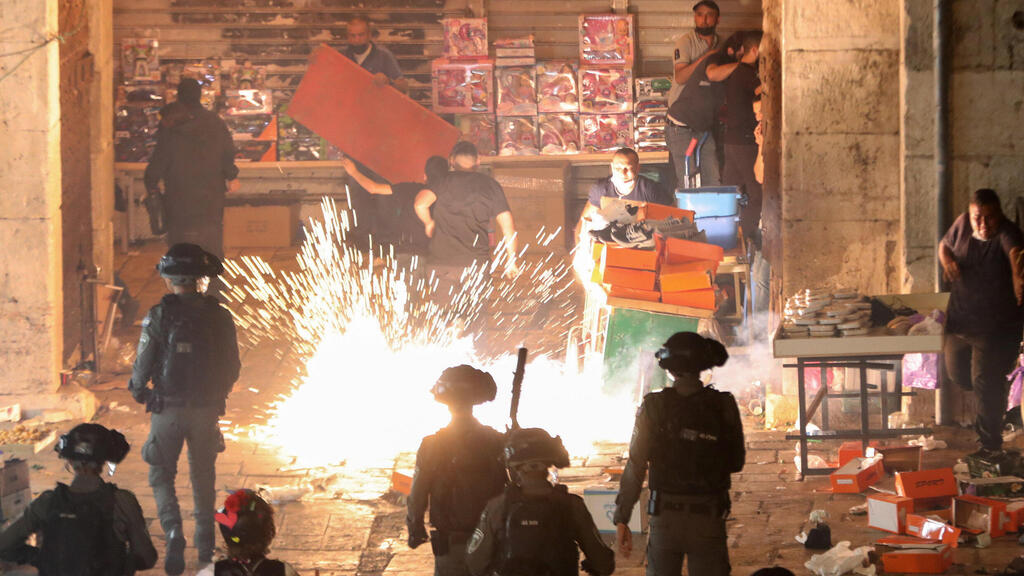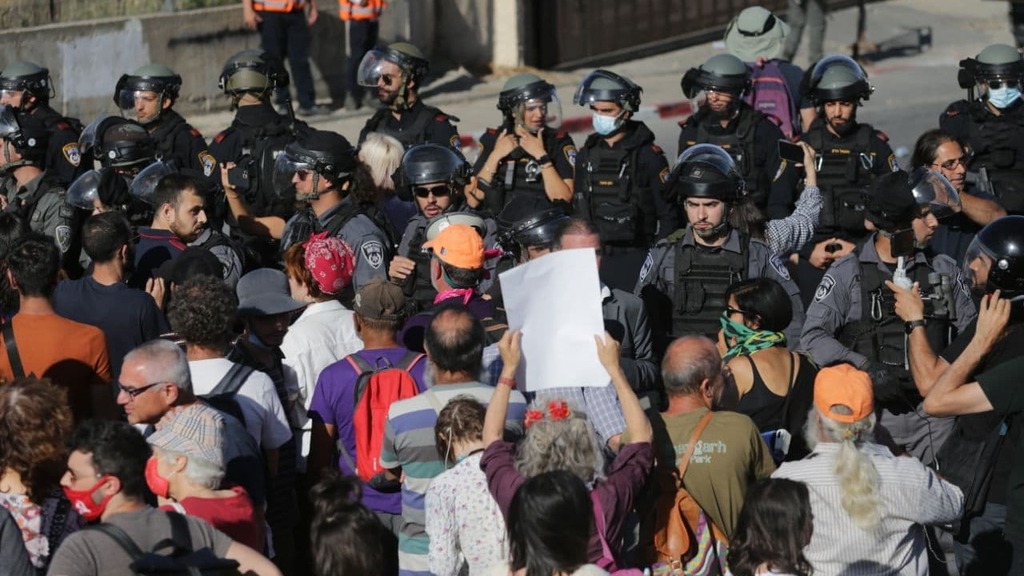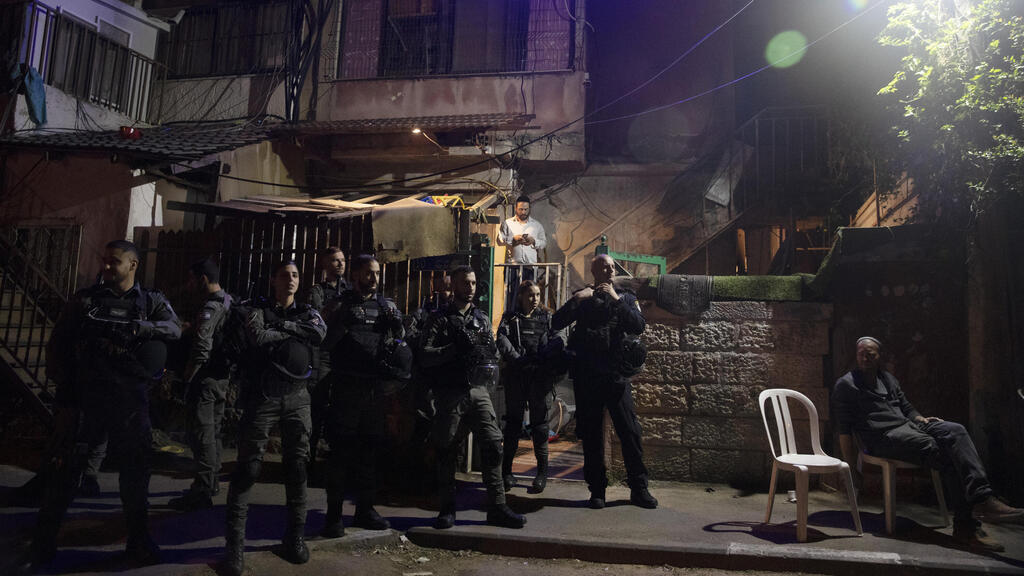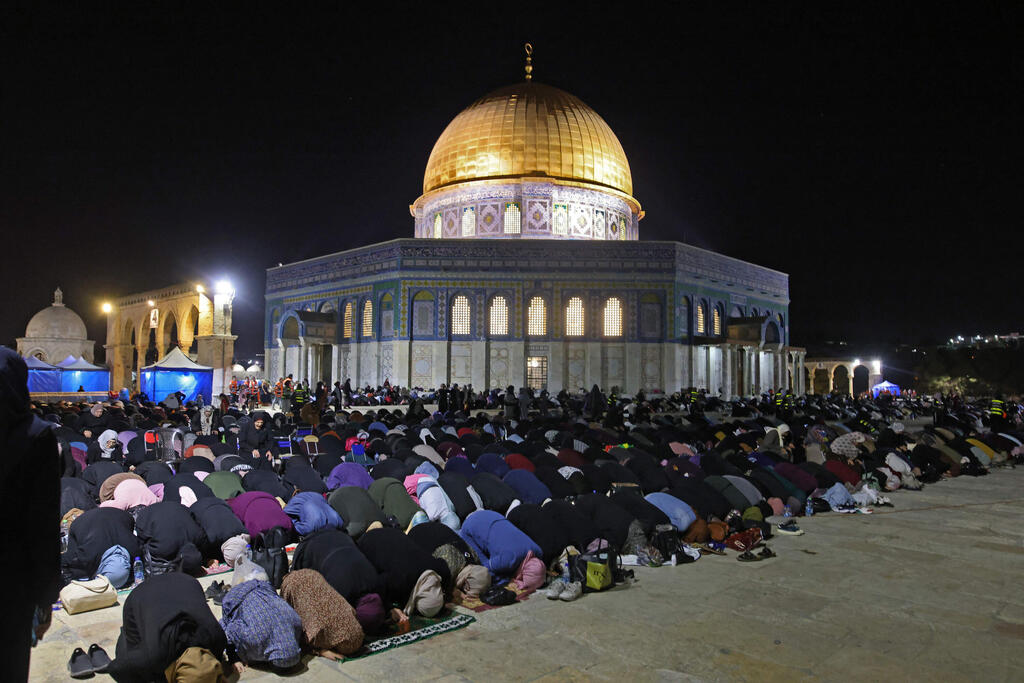It is fairly simple to pinpoint the causes of the current outbreak of violence in Jerusalem, which has seen hundreds of Palestinians and dozens of police officers wounded in clashes.
On the Palestinian side, the religious unrest that often occurs during the holy month of Ramadan tends to reach a peak towards the end of the weeks-long fast.
4 View gallery


Palestinians clash with Jerusalem police at the Damascus Gate to the Old City on Saturday
(Photo: Reuters)
In addition, the decision by Palestinian President Mahmoud Abbas to indefinitely postpone parliamentary elections - claiming Israel would not facilitate East Jerusalem voting - has inflamed the Hamas terror group that rules Gaza and was on track to make significant gains.
The group responded with rocket fire on Israeli communities close to the Israel-Gaza border and with calls for its followers in the West Bank to launch terror attacks against Israeli troops and settlers.
The 85-year-old Abbas is the last relic of the Fatah leadership to hold a position of power. Unlike his predecessor Yasser Arafat, Abbas has been actively opposed to the use of terror.
But his continued reign is criticized by many of his constituents and he has not made any progress towards the establishment of an independent Palestinian state.
Israel for its part, added to the already volatile situation with the decision to barricade off the plaza at the Damascus Gate entrance to the Old City of Jerusalem - causing Palestinian youths to clash with police.
Added to the mix is the possible eviction of Palestinian families from their homes in the East Jerusalem neighborhood of Sheikh Jarrah, as settlers claim the land as their own.
4 View gallery


Police and protesters face off at a demonstration against the eviction of Palestinians in Sheikh Jarrah
(Photo: Alex Kolomoisky)
The legal battle over property rights in Sheikh Jarrah is a different kind of tragedy. The plots in dispute were purchased by a Jewish endowment before Israel's independence.
After 1948 partition of Jerusalem into east and west with the Israel-Jordan border dividing them, the Jordanians used the Sheikh Jarrah land to build housing for Palestinian refugees who fled homes in the newly established state of Israel.
After the 1967 Six-Day War, when Israel won control of the entire city, it introduced unjust and indefensible laws allowing Jewish-owned land to be claimed back from its Palestinian residents - but Palestinians displaced from their property in western Jerusalem were not given the same rights.
Settlers then began claiming property inhabited by Palestinian families, and some of whom are now facing eviction from homes that they have lived in for decades.
Extreme right MK Itamar Ben-Gvir (Prime Minister Benjamin Netanyahu's gift to Hamas) on Friday strode into the neighborhood to announce he would be opening his parliamentary office there, provoking more protests and violence.
Ben-Gvir has used his parliamentary immunity to transform a local dispute into a Palestinian cause célèbre.
4 View gallery


Israeli police guard a Palestinian home currently occupied by settlers in the Sheikh Jarrah neighborhood of East Jerusalem
(Photo: AFP)
Sheik Jarrah houses international consulates, NGOs, the Israel Police headquarters, and several government ministries.
Late Likud prime minister Menachem Begin also intended to move his office there, but reversed course under international pressure and threats of boycott.
The legal dispute in the East Jerusalem neighborhood must be resolved on a governmental level. The cabinet could expropriate the land in question and allow the Palestinian residents to remain in their homes.
But there is no functioning government and the responsibility to resolve the dispute now falls to the Supreme Court.
The decision by Jerusalem police to corner off the plaza outside the Damascus Gate was a mistake. As was the decision to enter the al-Aqsa mosque compound last week and clash with Palestinian protesters.
The police were also wrong on Saturday to stop buses carrying Israeli Arab worshippers into Jerusalem for prayers on Laylat al-Qadr, the holiest night of the Muslim calendar.
4 View gallery


Muslim worshipers pray outside in the al-Aqsa Mosque compound on Saturday night
(Photo: AP)
As violent as the the past few days have been, the police deserve some credit for not using deadly force.
The sight of young Palestinian protesters being buried after dying at the hands of the Israeli police would have sent tensions into the stratosphere and almost guaranteed that a localized outbreak of violence would spread to the West Bank, Gaza and even beyond.

